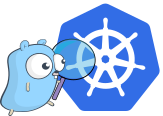

# Get pods that hase name containing "ovs"
kubectl-sql --all-namespaces get pods where "name ~= 'ovs'"
AMESPACE NAME PHASE hostIP CREATION_TIME(RFC3339)
openshift-cnv ovs-cni-amd64-5vgcg Running 192.168.126.58 2020-02-10T23:26:31+02:00
openshift-cnv ovs-cni-amd64-8ts4w Running 192.168.126.12 2020-02-10T22:01:59+02:00
openshift-cnv ovs-cni-amd64-d6vdb Running 192.168.126.53 2020-02-10T23:13:45+02:00
...
# Get all pods from current namespace scope, that has a name starting with "virt-" and
# IP that ends with ".84"
kubectl-sql get pods where "name ~= '^virt-' and status.podIP ~= '[.]84$'"
AMESPACE NAME PHASE hostIP CREATION_TIME(RFC3339)
default virt-launcher-test-bdw2p-lcrwx Running 192.168.126.56 2020-02-12T14:14:01+02:00
...
# Get all persistant volume clames that are less then 20Gi, and output as json.
kubectl-sql -o json get pvc where "spec.resources.requests.storage < 20Gi"
... json
{
"storage": "10Gi"
}
...# Get replicas sets with 3 replicas but less ready relicas
kubectl-sql --all-namespaces get rs where "spec.replicas = 3 and status.readyReplicas < spec.replicas"
...

# Display non running pods by nodes for all namespaces.
kubectl-sql join nodes,pods on \
"nodes.status.addresses.1.address = pods.status.hostIP and not pods.phase ~= 'Running'" -A
...